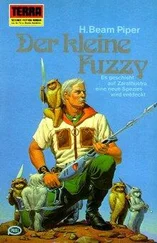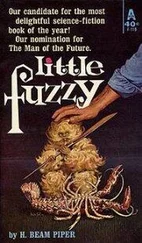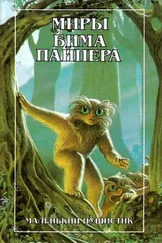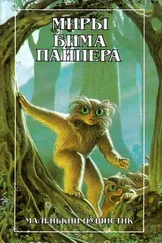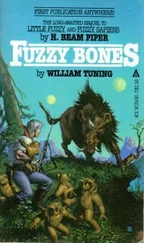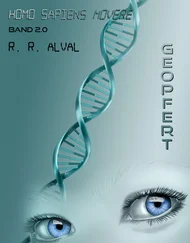H. Piper - Fuzzy Sapiens
Здесь есть возможность читать онлайн «H. Piper - Fuzzy Sapiens» весь текст электронной книги совершенно бесплатно (целиком полную версию без сокращений). В некоторых случаях можно слушать аудио, скачать через торрент в формате fb2 и присутствует краткое содержание. Год выпуска: 1976, ISBN: 1976, Издательство: Ace, Жанр: Фантастика и фэнтези, на английском языке. Описание произведения, (предисловие) а так же отзывы посетителей доступны на портале библиотеки ЛибКат.
- Название:Fuzzy Sapiens
- Автор:
- Издательство:Ace
- Жанр:
- Год:1976
- ISBN:0-441-26190-6
- Рейтинг книги:3 / 5. Голосов: 1
-
Избранное:Добавить в избранное
- Отзывы:
-
Ваша оценка:
- 60
- 1
- 2
- 3
- 4
- 5
Fuzzy Sapiens: краткое содержание, описание и аннотация
Предлагаем к чтению аннотацию, описание, краткое содержание или предисловие (зависит от того, что написал сам автор книги «Fuzzy Sapiens»). Если вы не нашли необходимую информацию о книге — напишите в комментариях, мы постараемся отыскать её.
. Also published as
.
Fuzzy Sapiens — читать онлайн бесплатно полную книгу (весь текст) целиком
Ниже представлен текст книги, разбитый по страницам. Система сохранения места последней прочитанной страницы, позволяет с удобством читать онлайн бесплатно книгу «Fuzzy Sapiens», без необходимости каждый раз заново искать на чём Вы остановились. Поставьте закладку, и сможете в любой момент перейти на страницу, на которой закончили чтение.
Интервал:
Закладка:
And now, within a day, it had been synthesized, if that were the word for it, by a rank amateur, a layman, a complete non-scientist. And not in a laboratory but in a kitchen, with no equipment but a battered old stew pan!
And the worst of it was that this layman, this empiric, was his employer. The claims of the manager-in-chief of the Zarathustra Company simply couldn’t be brushed off. Not by a Company scientist.
Well, Grego had found out what he wanted; he could stop worrying about that. He had important work to do; an orderly, long-term study of the differences between Zarathustran and Terran biochemistry. The differences were minute, but they existed, and they had to be understood, and they had to be investigated in an orderly, scientific manner.
And now, they wanted him to go haring off, hit-or-miss, after this problem about Fuzzy infant mortality and defective births, and they didn’t even know any such problem existed. They had one, just one, case — that six-month fetus the Andrews girl had brought in — and they had a lot of unsubstantiated theorizing by Gerd van Riebeek, pure conclusion jumping. And now they wanted him to find out if eating land-prawns caused these defective births which they believed, on the basis of one case and a lot of supposition, to exist. Maybe after years of observation of hundreds of cases they might have some justification, but…
He rose from the chair at the desk in the corner of the laboratory and walked slowly among the workbenches. Ten men and women, eight of them working on new projects that had been started since young van Riebeek had started after this mare’s-nest of his, all of them diverted from serious planned research. He stopped at one bench, where a woman was working.
“Miss Tresca, can’t you keep your bench in better order than this?” he scolded. “Keep things in their places. What are you working on?”
“Oh, a hunch I had, about this hokfusine.”
Hunch! That was the trouble, all through Science Center; too many hunches and not enough sound theory.
“About what?”
“Oh, the titanium thing. It’s a name Mr. Grego suggested, from a couple of Fuzzy words, hoku fusso, wonderful food. It’s what the Fuzzies call Extee-Three.”
Hokfusine, indeed. Now they were getting the Fuzzy language into scientific nomenclature.
“Well, just forget about your hunch,” he told her. “There are a lot of samples of organic matter, blood, body secretions, hormones, tissue, from pregnant female Fuzzies that they want analyzed. I don’t suppose it makes any more sense than your hunch, but they want analyses immediately. They want everything immediately, it seems. And straighten up that clutter on your bench. How often do I have to tell you that order is the first virtue in scientific work?”
CHAPTER SIXTEEN
THEY WERE IN Jack’s living room, and it looked almost exactly as it had the first night Gerd van Riebeek had seen it, when he and Ruth and Juan Jimenez had come out to see the Fuzzies, without the least idea that the validity of the Company’s charter would be involved. All the new office equipment that had cluttered it had gone, in the two weeks he and Ruth had been in Mallorysport, and there was just the sturdy, comfortable furniture Jack had made himself, and the damnthing and the bush-goblin and veldbeest skins on the floor, and the gunrack with the tangle of bedding under it.
There were just five of them, as there had been that other evening, three months, or was it three ages, ago. Juan Jimenez and Ben Rainsford were absent, in Mallorysport, but they had been replaced by Pancho Ybarra, lounging in one of the deep chairs, and Lynne Andrews, on the couch beside Ruth. Jack sat in the armchair at his table-desk, trying to keep Baby Fuzzy, on his lap, from climbing up to sit on his head. On the floor, the adult Fuzzies — just Jack’s own family; this was their place, and the others didn’t intrude here — were in the middle of the room, playing with the things that had been brought back from Mallorysport. The kind of playthings Fuzzies liked; ingenuity-challenging toys for putting together shapes and colors.
He was glad they weren’t playing with their molecule-model kit. He’d seen enough molecule models in the last two weeks to last him a lifetime.
“And there isn’t anything we can do about it, at all?” Lynne was asking.
“No. There isn’t anything anybody can do. The people in Mallorysport have given up trying. They’re still investigating, but that’s only to be able to write a scientifically accurate epitaph for the Fuzzy race.”
“Can’t they do something to reverse it?”
“It’s irreversible,” Ruth told her. “It isn’t a matter of diet or environment or anything external. It’s this hormone, NFM p, that they produce in their own bodies, that inhibits normal development of the embryo. And we can’t even correct it in individual cases by surgery; excising the glands that secrete it would result in sterility.”
“Well, it doesn’t always work,” Jack said, lifting Baby Fuzzy from his shoulder. “It didn’t work in Baby’s case.”
“It works in about nine cases out of ten, apparently. We’ve had ten births so far; one normal and healthy, and the rest premature and defective, stillbirths, or live births that die within hours.”
“But there are exceptions, Baby here, and the one over at the Fuzzy-shelter,” Lynne said. “Can’t we figure out how the exceptions can be encouraged?”
“They’re working on that, in a half-hearted way,” he told her. “Fuzzies have a menstrual cycle and fertility rhythm, the same as Homo s. terra, and apparently the NFM poutput is also cyclic, and when the two are out of phase there is a normal viable birth, and not otherwise. And this doesn’t happen often enough, and any correction of it would have to be done individually in the case of each female Fuzzy, and nobody even knows how to find out how it could be done.”
“But, Gerd, the whole thing doesn’t make sense to me,” Pancho objected. “I know, ‘sense’ is nothing but ignorance rationalized, and this isn’t my subject, but if this NFM pthing is a racial characteristic, it must be hereditary, and a hereditary tendency to miscarriages, premature and defective births, and infant mortality, now what kind of sense does that make?”
“Well, on the face of it, not much. But we know nothing at all about the racial history of the Fuzzies, and very little about the history of this planet. Say that fifty thousand years ago there were millions of Fuzzies, and say that fifty thousand years ago environmental conditions were radically different. This NFM phormone was evolved to meet some environmental survival demand, and something in the environment, some article of diet that has now vanished, kept it from injuriously affecting the unborn Fuzzies. Then the environment changed — glaciation, glacial recession, sea-level fluctuation, I can think of dozens of reasons — and after having adapted to original conditions, they couldn’t re-adapt to the change. We’ve seen it on every planet we’ve ever studied; hundreds of cases on Terra alone. The Fuzzies are just caught in a genetic trap they can’t get out of, and we can’t get them out of it.”
He looked at them; six happy little people, busily fitting many-colored jointed blocks together to make a useless and delightful pretty-thing. Happy in ignorance of their racial doom.
“If we knew how many children the average female has in her lifetime, and how many child bearers there are, we could figure it out mathematically, I suppose. Ten little Fuzzies, nine little Fuzzies, eight little Fuzzies, and finally no little Fuzzies.”
Little Fuzzy thought he was being talked about; he looked up inquiringly.
“Well, they won’t all just vanish in the next minute,” Jack said. “I expect this gang’ll attend my funeral, and there’ll be Fuzzies as long as any of you live, and longer. In a couple of million years, there won’t be any more humans, I suppose. Let’s just be as good to the Fuzzies we have as we can, and make them as happy as possible… Yes, Baby; you can sit on Pappy’s head if you want to.”
Читать дальшеИнтервал:
Закладка:
Похожие книги на «Fuzzy Sapiens»
Представляем Вашему вниманию похожие книги на «Fuzzy Sapiens» списком для выбора. Мы отобрали схожую по названию и смыслу литературу в надежде предоставить читателям больше вариантов отыскать новые, интересные, ещё непрочитанные произведения.
Обсуждение, отзывы о книге «Fuzzy Sapiens» и просто собственные мнения читателей. Оставьте ваши комментарии, напишите, что Вы думаете о произведении, его смысле или главных героях. Укажите что конкретно понравилось, а что нет, и почему Вы так считаете.

